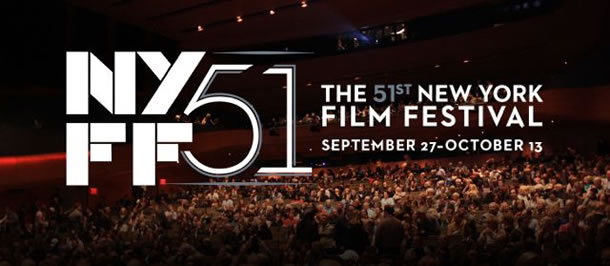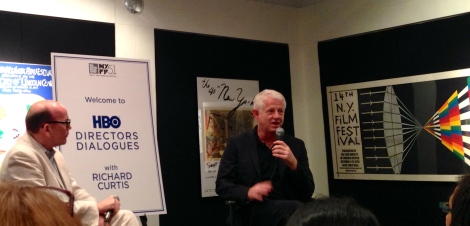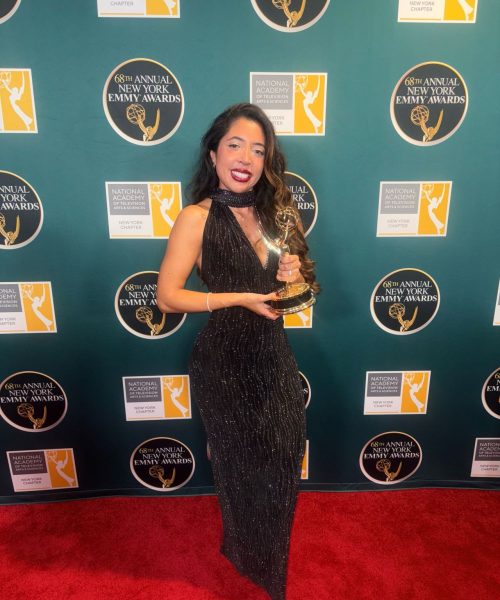HBO Directors Dialogue With Richard Curtis
In the small but intimate Walter Reade Theatre, right in the heart of the Lincoln Centre, screenwriter Richard Curtis gathered with a small group of big fans who had travelled from all over the place to hear him talk about his career in writing and directing.
They wanted to know if his life was based on the many Hugh Grant successes that he has penned, such as Four Weddings and a Funeral, Love Actually and Notting Hill.
Not quite, but that doesn’t mean Grant’s successful movies weren’t based on Curtis’ inspiration. After a brief but very intricately detailed introduction, the first question discussed his regrets, and how regret is a consistent theme within the movies he writes and directs. He says that he feels that it is best to show how a character reacts to regret, and how they then capture the opportunity that they missed.
A good example of this would be the last scenes in the 1999 movie

Notting Hill, where Hugh Grant’s character is faced with a decision and when he makes the blatant wrong choice, he has to dash around London trying to fix it. He goes on to say that one of the first scenes in his first big hit film was based around a story in his own life. He says that just like in Four Weddings and a Funeral, he went to a friend’s wedding and ended up meeting a girl and coincidently, they were staying at the same hotel. The difference with Curtis’ story is that rather than going back with the girl, who he would never meet again, he went back with his friends and had the most uneventful evening of his life playing Boggle.
Before he started producing material for Working Titles, he was given the chance to pitch a movie to MGM in the United States. The only problem was that he had to come up with a brand new idea on his way to meet them. The idea was the story of a father and son who had both just found out that their wife and girlfriend had both been cheating on them, and how they just decided to leave and start a new life somewhere else. MGM said that they liked the movie, but they wanted to change the dialogue, characters and even the jokes. They wanted the base of the storyline, but all of Curtis’ creative intellect was to be removed. As you can imagine this was a huge turning point in Curtis’ career.
“From that moment on, I decided to always write about the street I was living on,” and never about anything he hadn’t experienced in some way, shape or form.
His first big break came about due to a stroke of good fortune and a good friend of his from Oxford University. Rowan Atkinson had given him a job on the BBC’s “Not the 9 O’clock News.” Curtis described working with Atkinson on this project as “invaluable experience” and that Atkinson’s “blinding genius” had rubbed off on everybody, and he could tell he was going to be successful right from the start. Curtis’ father was an executive at the Unilever company, and Curtis believed that without Rowan Atkinson, he would have definitely been thrust into the marketing department to produce sentimental ads for Dove.
“It was a lovely time before ratings, but I would still wander around my hometown looking into people’s windows to see if they were watching Not the 9 O’clock News or even Blackadder but I feel that I really came into my own after my transition from television to film. With television, I was working with some of the best dry witted comedians on British screens in Fry, Atkinson and Laurie, but I could never be allowed to express emotion, and this is why I think I felt such a warm feeling after Four Weddings. All the soppy stuff was able to flow and I felt that I could take control of everything”
After this experience, Curtis has always believed in taking full control and being involved in every part of his productions. Casting would be a paramount part of the directors process for Curtis, he felt that the person had to be perfect for a role or else they wouldn’t be able to make the strict image that he held in his mind.
“Even the smallest of things can affect the entire outcome of a movie. As a great example of a fatal error, during the filming of The Tall Guy, the script gave Emma Thompson the stage direction to say her lines with sadness and emotion. During rehearsal that’s exactly what she did, however when it came to filming, I had a dentist appointment and during the scene, Thompson gave an intense stare, thus looking like a strong woman rather than a sad one. In my mind, it ruined the whole idea of the film and led to the entire story to not making sense. What’s the point in creating something that’s completely yours if you aren’t going to be there?”
It was not the only time it happened. The filming of Love Actually came with many problems, he said.
“The casting was an argumentative progress, I had a very traditional cameraman who took far too long on doing one scene, and of course working with Alan Rickman is always fun. (A laugh from the audience as he rolls his eyes) Directing is very hard and I really think that the strange knowledge of how to make a camera tell an emotional story is just like playing a piano – generating the emotions between different types of people is such a mystery.”
A member of the audience directed a question to Curtis about the Emma Thompson character, asking if “the movie itself is an ongoing argument about the omnipresence of love yet the older, stronger women are shown crying and breaking down. Do you (Richard Curtis) feel this was intended, and do you think you could ever write a spin off about either the Thompson character or even the Laura Linney character?”
He stated he never intended a spinoff. “When I write a film about love, I wouldn’t want to overturn it with sad aspects. Some people are ambassadors for love; painters like Shegal – who depict love as a goat flying over a house. I portray it with the emotions that I connect with my own feelings of love. The mixture of both the highs and lows, and this is what I wanted to portray in Love Actually.”
Americans and the British do have a different sense of humor, but only to a certain extent, but what do we all find funny?
“Do the Americans find Spike from Notting Hill as funny as we do?”asked a fellow Brit.
“Monty Python has a completely different style of humour to my own, and Woody Allen has a completely different style of humour to National Lampoons. So I don’t think that we can categorize a certain sense of humor. People enjoy what they enjoy, it’s what they take away from the film that counts, and that is what I try to get at in my own writing. Steve Coogan once said that the U.S. has a way finding the humour on the route to success and the British have a way of finding humour on the way from failure.”
He added that the best comedy performances come from the actors who play the character as if they were just a real person in an ordinary situation. Rhys Ifans and Bill Nighy are the best examples of this for heir performances in Notting Hill & Love Actually respectively.
A final question of simply “Why do you what you do?” made him pause for a moment.
“When I write something, I want to feel delighted by the feelings and the outcome of the story – delight in cinema really can do that to you and that’s what I want. I want the feeling of a Friday night with your five best friends sharing a few bottles of wine and laughing. Just having a delightful time.”
Richard Curtis’ tips on writing.
1. Write five ideas for the same scenario if you can’t think of something. This gives your mind a choice and it will try to develop on the one you like the most almost instantly.
2. Live with your writing. If you’re writing about London – move to London.
3. Take all the time you need.
4. Listen to pop music. Let it inspire you.
5. Write a lot and be critical. I try to write thirty pages a day and I may keep about half a page of content. Never leave an empty page empty.

Sam Neve is junior international student from Great Britain studying Journalism. He has an eclectic taste in both music and sports and enjoys going to...










